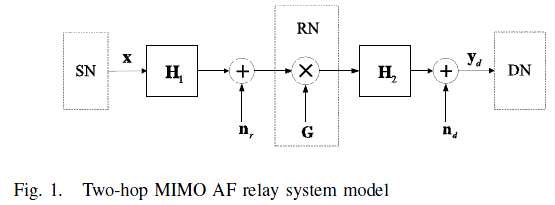TR2011-061
Pilot Matrix Design for Estimating Cascaded Channels in Two-Hop MIMO Amplify-and-Forward Relay Systems
-
- , "Pilot Matrix Design for Estimating Cascaded Channels in Two-Hop MIMO Amplify-and-Forward Relay Systems", IEEE Transactions on Wireless Communications, DOI: 10.1109/TWC.2011.041311.101477, Vol. 10, No. 6, pp. 1956-1965, April 2011.BibTeX TR2011-061 PDF
- @article{Ma2011apr,
- author = {Ma, J. and Orlik, P. and Zhang, J. and Li, G.Y.},
- title = {{Pilot Matrix Design for Estimating Cascaded Channels in Two-Hop MIMO Amplify-and-Forward Relay Systems}},
- journal = {IEEE Transactions on Wireless Communications},
- year = 2011,
- volume = 10,
- number = 6,
- pages = {1956--1965},
- month = apr,
- doi = {10.1109/TWC.2011.041311.101477},
- url = {https://www.merl.com/publications/TR2011-061}
- }
- , "Pilot Matrix Design for Estimating Cascaded Channels in Two-Hop MIMO Amplify-and-Forward Relay Systems", IEEE Transactions on Wireless Communications, DOI: 10.1109/TWC.2011.041311.101477, Vol. 10, No. 6, pp. 1956-1965, April 2011.
-
MERL Contacts:
-
Research Area:

Abstract:
In this paper, we consider a two-hop multi-inputmulti-output (MIMO) amplify- and-forward (AF) relay system consisting of a source node (SN), a destination node (DN), and a relay node (RN) that simply amplifies and forwards its received signal to the DN without any further processing. In this system, the overall channel from the SN to the DN is a cascade of the backward relay channel over the SN-RN hop, the amplifying matrix at the RN, and the forward relay channel over the RNDN hop. We investigate the estimation of the two cascaded relay channels at the DN based on the predefined amplifying matrix applied at the RN and the corresponding overall channel obtained through the conventional channel estimation algorithms with the help of pilots transmitted by the SN. In particular, we find necessary and sufficient conditions on the pilot amplifying matrix sequence at the RN to ensure feasible relay channel estimation at the DN. Based on these conditions, we present rules to design diagonal or quasi-diagonal pilot amplifying matrices so that the cascaded relay channels can be estimated with minimum complexity at the RN. In the presence of imperfect overall channel state information at the DN, we further develop the approximate linear least-square estimation of the relay channels based on the designed pilot matrix sequence and demonstrate its performance by simulation results.
Related News & Events
-
NEWS IEEE Transactions on Wireless Communications: publication by Philip V. Orlik, Jinyun Zhang and others Date: April 21, 2011
Where: IEEE Transactions on Wireless Communications
MERL Contacts: Jinyun Zhang; Philip V. Orlik
Research Area: CommunicationsBrief- The article "Pilot Matrix Design for Estimating Cascaded Channels in Two-Hop MIMO Amplify-and-Forward Relay Systems" by Ma, J., Orlik, P., Zhang, J. and Li, G.Y. was published in IEEE Transactions on Wireless Communications.

